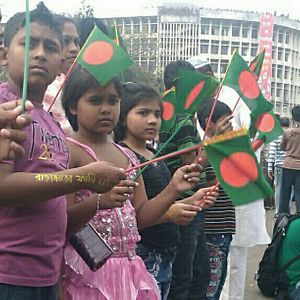Bangladesh has always prided itself for its religious tolerance and secularism. In fact, the country is a shining example of Islam and democracy coexisting. However, all that is changing quickly with the rise of religious fundamentalism in the country. There is growing violence against minorities, especially Hindus, but also against both Hindu and Muslim writers, authors, and bloggers who have taken to social media to express their anger against the growing atrocities in the country. The Islamist fundamentalists, apart from targeting minorities, have targeted all those who have commented on religion and who are fighting for their right to the freedom of expression.
The recent murder of a Hindu tailor Nikhil Joarder by Islamist militants over the unsubstantiated claims that he had insulted the Prophet Muhammad has sent shockwaves through the country’s Hindu community. Over the past three years more than 20 people, including Hindu and Muslim bloggers, academics, foreigners, and religious minorities, have been killed.
Earlier this year, machete-wielding radicals brutally murdered Razaul Karim Siddique, a professor of English at Rajshahi University, Bangladesh on the specious charge that he was propagating atheism on the campus, a claim vehemently denied by his daughter and his colleagues at the university. According to them, the professor was a God-fearing man and also was apolitical. Siddique is the fourth professor of the university who has been brutally murdered by Islamic militants. It is alleged that the cause of his murder may have had something to do with his involvement in organizing cultural events, especially the founding of a musical school in Bagmara, a bastion of outlawed Islamist group Jamayetul Mujahideen Bangladesh (JMB). Culture, especially music, is anathema to the Islamic ideologues as it is considered un-Islamic.
The so-called radical forces have so far brutally murdered 20 people, including five secular provocateurs, for fighting for freedom of speech in the country. The JMB and other groups claiming allegiance to the Islamic State have not only targeted non-Muslims, but also have not spared Muslims who don’t subscribe to their ideology. For instance, Muhammad Khizir Khan, the former chairman of Bangladesh Power Development Board and a religious instructor on Sufism, was slaughtered. The terrorists have also not spared foreigners. Two foreigners–and Italian aid worker Cesare Tavella and Japanese farmer Kunio Hoshi were also brutally murdered. Italian priest Piero Parolari, who was assaulted, was lucky to survive.
Many of the bloggers, publishers, and writers who have found their names in the hit list released by Ansarullah Bangla Team (ABT) have either fled the country or gone into hiding in fear for their lives. A poignant blog post, published by one of the bloggers who has recently fled the country, bemoans the fact that the government has remained silent and unresponsive to the killings of several bloggers, including Avijit Roy, a Bangladeshi-American blogger, who fought for freedom of expression through his blogs and social media posts and had organized international protests against the government’s censorship and imprisonment of atheist bloggers. Roy was slaughtered by the machete-wielding terrorists.
There is a growing sense of fear and insecurity; people in Bangladesh are living under the threat of “machete terrorism.” Moreover, the lukewarm response of the government has only emboldened the radical elements belonging to the hardline Islamist groups such as ABT and JMB. These groups have no fear of specifically targeting the bloggers, writers, and publishers who have taken to social media forums and their blogs to assiduously defend the civil liberties of Bangladeshis.
Many secular groups have voiced their concerns that the government has not taken these brutal murders seriously, thereby emboldening these radical elements. PEN America, an advocacy group promoting freedom of expression worldwide, in a scathing attack on the government, issued a statement saying that “the persistent failure of the Bangladesh Government and the international community to better protect threatened thinkers has created a climate of fear and direct threat to free thought in the country.”
The spate of ideological murders is an assault on Bangladesh’s secular principles and ideas. The complicity of the Sheikh Hasina-led government is being increasingly being questioned. Every time a heinous crime against free thought and expression occurs, instead of investigating the matter, she lays the blame squarely at the feet of the opposition Bangladesh Nationalist Party, led by her bête noir, Begum Khalida Zia. Many analysts believe the police are not taking the investigation seriously because of Hasina’s comments, which include criticism of the atheist bloggers for sullying the image of the Prophet.
Bangladesh is facing an existential crisis today and unless the government takes steps to launch an all-out attack on the members of AMT and JMB, the situation may spiral out of control. It is also surprising that, except for opprobrium in international newspapers on the growing intolerance in the country, many countries like the United States, the United Kingdom, and even neighboring India have remained silent over the issue. It is time that they exert pressure on the Bangladeshi government to act against the perpetrators of these crimes. The government should also realize by not acting against these perpetrators, the groups will be further emboldened to carry out more such attacks against the secular forces. The day is not far when these groups are likely to be exploited by terrorist organizations like al Qaeda and the Islamic State, for not only gaining a toehold in the region, but also an opportunity to radicalize the youth of the country.
Before it’s too late, the government must launch an all out attack on these fundamental groups, lest the country fall into an abyss of violence, which would completely destroy the secular character of Bangladesh.
Venkatachalam K.S. is an independent columnist and political commentator. He writes a regular column for the Huffington Post and Express Tribune. His articles have also been featured in The Hindu, South China Morning Post, Friday Times, and Global Times.

































